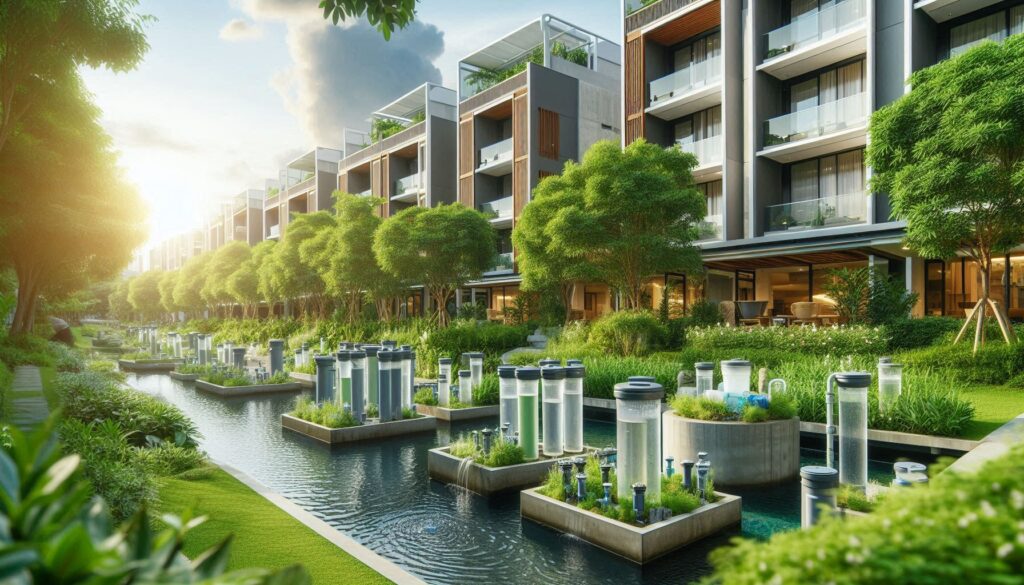As India faces increasing water scarcity and pollution, the government is set to introduce the Liquid Waste Management Rules, 2024, which bring a transformative approach to managing wastewater across the country. These rules, soon to be enacted, emphasize recycling and reuse of wastewater in residential, industrial, and urban sectors. For communities and industries alike, compliance with these rules represents both an opportunity and a challenge, and it could reshape water sustainability practices nationwide.
Overview of the New Rules
The draft Liquid Waste Management Rules, 2024, outline stringent guidelines for wastewater management across multiple sectors, including residential complexes, industries, and urban local bodies. Key elements include:
- Categorization of bulk water users: Societies consuming over 5,000 liters of water daily or generating over 10 kg of Biological Oxygen Demand (BOD) must comply with strict wastewater treatment standards.
- Extended User Responsibility (EUR): EUR makes it mandatory for bulk water users to treat and reuse wastewater.
- Centralized Monitoring: Societies and industries must report water consumption and wastewater treatment data monthly and annually through a centralized platform managed by the Central Pollution Control Board (CPCB).
With these measures, the government aims to promote water recycling and ensure efficient use of resources.
What the New Rules Mean for Residential Societies
Under the new rules, residential societies are identified as “bulk users” of water and will be expected to take responsibility for wastewater treatment and reuse. Starting in 2027, new societies must recycle at least 20% of their water usage, increasing to 50% by 2030. Existing societies, meanwhile, will need to achieve 10% water recycling by 2027, with a goal of 25% by 2030.
This shift could be challenging for some apartment complexes due to the costs and infrastructure needed to treat and recycle water. However, implementing sustainable water management systems will have significant benefits, such as reducing reliance on external water sources, cutting costs over time, and promoting environmental sustainability.
Extended User Responsibility: What It Means for Communities
A key feature of the rules, Extended User Responsibility (EUR), mandates that communities take ownership of their wastewater output. Bulk water users must monitor and report on their water usage, wastewater production, and treatment efforts, ensuring that they meet the set recycling targets.
This new standard means that communities will need to partner with reliable water treatment providers like Genviss to ensure compliance. Proper planning, regular reporting, and consistent adherence to EUR standards can streamline compliance and maximize the reuse of treated water within societies.
Impact on Industrial Clusters
Industries are also required to adopt substantial water recycling practices. According to the rules, high-water-usage sectors like thermal power plants, the textile industry, and paper manufacturing must achieve a 60% wastewater reuse rate by 2027. For example, a plant consuming 100,000 liters of water per day would need to recycle at least 60,000 liters.
These standards underscore the importance of advanced treatment technologies, such as membrane filtration and biological treatment systems, to efficiently reuse wastewater. Genviss’s industrial solutions provide the advanced technology necessary to help industries meet these requirements and contribute to a sustainable water management ecosystem.
Real Estate Developers Adapting to Change
As water management standards tighten, real estate developers are beginning to adopt water-saving practices, implementing recycling systems in construction projects and opting for eco-friendly materials that reduce water usage. For instance, properties in water-scarce areas are installing rainwater harvesting systems and greywater recycling units to meet the anticipated legal requirements for water sustainability.
These changes highlight a shift toward environmentally-conscious construction, a trend that could have significant long-term benefits for India’s water resources. Through strategic design and partnerships with water management experts, developers are laying the groundwork for sustainable urban expansion.
The Role of Genviss in Enabling Compliance and Sustainability
With the new rules on the horizon, residential and industrial entities across India will need to seek reliable partners for wastewater treatment and compliance. Genviss offers tailored water management solutions for both residential and industrial settings, from small communities to large-scale industries. Our systems focus on high-efficiency treatment methods, and they are designed to meet the rigorous standards set by the new regulations.
Genviss’s expertise in reverse osmosis, biological treatment, and advanced filtration systems supports clients in achieving required recycling and reuse rates. Our solutions not only meet compliance standards but also promote sustainability by conserving water resources and minimizing environmental impact.
What Lies Ahead: Opportunities and Challenges
While the Liquid Waste Management Rules, 2024, represent a step forward for India’s water management landscape, compliance will require a significant adjustment period. Here’s what entities can expect:
- Enhanced Accountability: The EUR guidelines will make water usage tracking a priority, and communities will need reliable systems to maintain accurate records.
- Investment in Infrastructure: Both residential societies and industries must invest in water treatment facilities and personnel training to meet the recycling targets.
- Collaboration with Authorities: Regular reporting to the CPCB will ensure compliance, and partnerships with regulatory bodies can smooth out any compliance hurdles.
The success of these initiatives will largely depend on widespread adoption and community engagement, making the involvement of citizens essential to ensuring responsible water use.
Final Thoughts
The Liquid Waste Management Rules, 2024, represent an opportunity for India to move towards sustainable water practices, but they also come with significant responsibilities for all stakeholders involved. By fostering collaboration, investing in infrastructure, and embracing advanced water treatment technologies, communities and industries can help ensure a future where water resources are managed wisely.
For background on the Liquid Waste Management Rules, 2024, the Times of India has provided an in-depth overview, covering its implications for wastewater management in India’s residential and industrial sectors. You can read more in detail in the article here: Times of India.
At Genviss, we are committed to helping our clients achieve water sustainability through cutting-edge solutions that align with the latest government regulations. Partnering with us means not only ensuring compliance but also contributing to India’s vision of a sustainable future.

